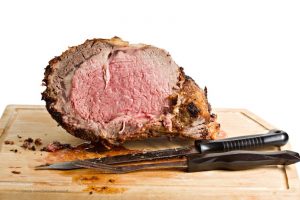The government of Canada is mandating labeling of mechanically tenderized beef. All MTB products sold in Canada must be clearly labeled as “mechanically tenderized” and include instructions for safe cooking. These products have been tenderized by piercing with needles or blades. This process introduces bacteria into the center of the cut of meat, and means the meat is not safe to consume unless it is cooked well done.
 Several outbreaks in both Canada and the United States have been linked to undercooked mechanically tenderized beef. An E. coli O157:H7 outbreak in Canada in 2012 was linked to mechanically tenderized beef produced by XL Foods; at least 10 people were sickened. In the United States, there were at least five outbreaks of E. coli O157:H7 linked to mechanically tenderized beef in the United States between 2003 and 2009.
Several outbreaks in both Canada and the United States have been linked to undercooked mechanically tenderized beef. An E. coli O157:H7 outbreak in Canada in 2012 was linked to mechanically tenderized beef produced by XL Foods; at least 10 people were sickened. In the United States, there were at least five outbreaks of E. coli O157:H7 linked to mechanically tenderized beef in the United States between 2003 and 2009.
This change applies to all industry selling uncooked or raw MTB products to other facilities or to consumers, including groceries, meat processors, and butcher shops. All federally regulated plants have been required to label those products since July 2013. It is not possible to tell by looking at a product if it has been mechanically tenderized, since the needle and blade holes are so small.
Attorney Fred Pritzker has been an advocate for labeling mechanically tenderized beef for years. Pritzker has represented patients who have been sickened by mechanically tenderized, also known as non-intact, steaks. Back in 2010, Pritzker said about an outbreak linked to tenderized beef: “This is at least the fourth E. coli O157:H7 outbreak associated with mechanically tenderized beef. Meat companies and restaurants don’t warn consumers about mechanical tenderization and the dangers that go with it.”
The USDA in the United States proposed a rule for labeling mechanically tenderized beef in 2013, but the final rule has not been published. It was expected in June 2014. Consumer advocates have been asking the government for years to implement this rule to help keep consumers safe.




